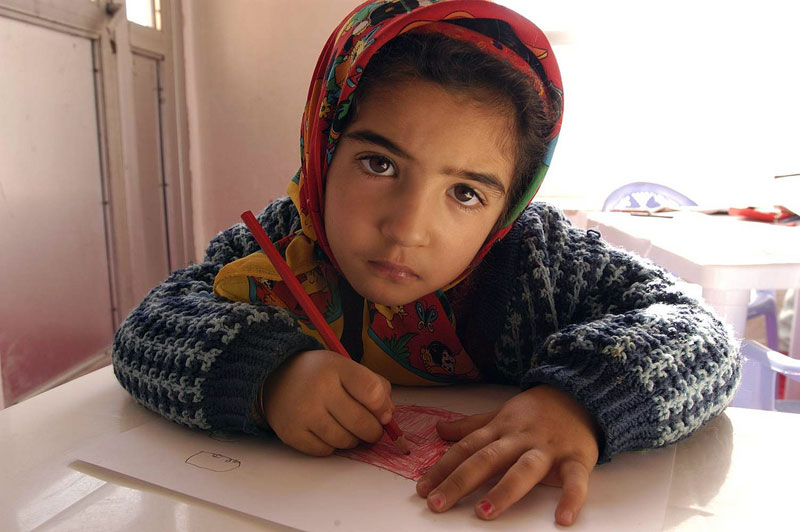
"It was remarkable to see the passion and desire for change, the commitment to helping their Azerbaijani neighbors as good citizens of the community. Upon deep reflection, I have learned so much about the Azerbaijani culture, people, and education including the Azeri-Armenian conflict with the Karabakh territory, microfinance loan programs in third world countries, environmental impacts of oil refinery, Azeri poets and literature, and globalization within a developing government and economy. Now in turn, I definitely want to use my experience as a catalyst to expand my students' analytical and critical thinking skills when comparing and contrasting global communities so that they can become more knowledgeable global citizens and learners. "
Chon Lee writes: I had the great pleasure to meet and work alongside some extraordinary Peace Corps volunteers stationed in remote places in Azerbaijan, such as a small mountainous village called Luhic with only one school of roughly 70 children
Struck by the inequality in education abroad
By Chon Lee
June 04, 2009
Azerbaijan.
Caption: Girl in a rural day care centre in Western Azerbaijan by unicefiran Flickr Creative Commons Attribution-No Derivative Works 2.0 Generic
The mere name connotes the foreign and uncharted terrain. It appears that not too many people have been to, let alone heard of, this small Caucasus republic alongside the Caspian Sea. My own students at Lincoln Middle School had a difficult time recognizing the country; one comic relief moment came when an ingenuous boy expressed his utter excitement for me to travel to "Azkaban" in the Harry Potter series, an obvious misinterpretation between the imaginary and reality.
I recently returned from the Eurasian third-world country where I had the privilege to participate in a two-week intensive, bilateral exchange entitled Teaching Excellence and Achievement. This educator grant is sponsored by the United States Bureau of Educational and Cultural Affairs and implemented through the International Research and Exchange Board (IREX). I was selected alongside 12 other teachers from across the United States to represent our communities and schools in different Eurasian countries (Azerbaijan, Uzbekistan, Kyrgyzstan, and Turkmenistan to name a few) to share best practices with international secondary teachers.
In my travels, I was remarkably fortunate to work with Azeri teachers from a diverse range of school environments: rural and urban, private and public, developed and emerging. I partnered up with multiple schools and co-taught in Azerbaijani classrooms, conducted professional development workshops for secondary educators, and facilitated discussion forums on educational policy at local universities. It was simply beguiling to see the effects of modern affluence in Baku (the capital) schools juxtaposed with emerging, traditional schools in smaller disadvantaged cities like Sumgayit and Ismayli. It definitely appears to reflect the ideology of how the "rich get richer and poor get poorer" with a struggling emergence of a middle-class. I kept wondering about how the pervasiveness of indifference within the oil-rich regions could be streamlined to help bridge the gap with the absolute poor and underprivileged.
In a country that is so obviously thriving both economically and socially in the metropolitan city of Baku, I kept wondering how the country can better transition and feed that wealth appropriately to the rest of the country that so desperately needs it. It is clear that the Azerbaijani government and Ministry of Education believes in the value of educating their children, but I'm left to speculate how this academic equity could be sustainable in a country where most resources are funneling into the capital oil-based territories, creating a social, economic, and educational divide.
In the past few years, I have seen this same precise economic imbalance in other grant-sponsored programs to South Africa and Cambodia. I have come to learn that economic power not only translates to social and political power but also how schools and the quality of education for children across the world are negatively impacted with lack of resources, untrained instructors, unsafe facilities, and outdated curriculum and frameworks. I still recall collaborating with teachers in Cape Town, South Africa and Phnom Penh, Cambodia and the universal theme of educational poverty was completely disheartening. How can a South African, Cambodian, or Azerbaijani teacher help students become life-long learners when there are so many short-term obstacles on a day-to-day basis?
Moreover, I had the great pleasure to meet and work alongside some extraordinary Peace Corps volunteers stationed in remote places in Azerbaijan, such as a small mountainous village called Luhic with only one school of roughly 70 children. It was remarkable to see the passion and desire for change, the commitment to helping their Azerbaijani neighbors as good citizens of the community. Upon deep reflection, I have learned so much about the Azerbaijani culture, people, and education including the Azeri-Armenian conflict with the Karabakh territory, microfinance loan programs in third world countries, environmental impacts of oil refinery, Azeri poets and literature, and globalization within a developing government and economy. Now in turn, I definitely want to use my experience as a catalyst to expand my students' analytical and critical thinking skills when comparing and contrasting global communities so that they can become more knowledgeable global citizens and learners.
Chon Lee is a National Board Certified English teacher at Lincoln Middle School in Santa Monica and can be contacted at clee@smmusd.org.












